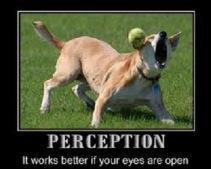 I have also been thinking a lot about how people assume that what’s true for them must be true for other people, or that if one person can do it than everybody can do it, and how dangerous that is in terms of how we treat each other and how we view society. I see this all over the place…
I have also been thinking a lot about how people assume that what’s true for them must be true for other people, or that if one person can do it than everybody can do it, and how dangerous that is in terms of how we treat each other and how we view society. I see this all over the place…
Those who love running may wrongly assume that everyone will love running if they just try, or everyone’s body feels the same as their body feels. This just isn’t true. It’s definitely not true for me – I was a soccer player in school and I ran a ton and the only “runner’s high” I get is when I stop running. Conversely it would be a mistake to assume that just because I hate running the people who say they love it are lying.
Some people who are part of the small percentage of people who diet successfully think that everyone can be successful because they were and, that those who don’t succeed (never mind that it’s the vast, vast majority of us) must be doing it wrong even though plenty of people who do what they did have a very different result.
Then there are people who think that if everyone ate like they did, then everyone would be their size- so if they are thin and eat a lot, then fat people must be eating tons more than they do. Of course everybody knows people who eat a ton and stays thin, it’s not surprising that others would eat a small amount and stay heavy.
It doesn’t help that we make role models out of people who are chosen for their ability to be statistical anomalies – we choose our actors, singers, dancers, and celebrities for their ability to meet a stereotype of beauty that is unachievable by almost everyone as our first priority, with their talent often a very distant second. Then, though we are clear that not everyone can sing, act, or dance, we suggest that everyone could look like these people if they tried hard enough.
We all have things that we are naturally good at, things that we can do with a struggle, and things that aren’t possible for us. It’s completely foolish to assume that list is the same for every person. The idea that “If I can do it, anybody can!” is completely false on every level, and is used to sell us all kinds of things that we want to believe are possible. Maybe somebody did lose 80 pounds using the Ab-Doer, or 100 pounds with Weight Watchers, but that “results not typical” fine print is there for a reason. That reason is because, typically, this is NOT the client experience. Marketing a best case scenario that almost never happens is legal, and as consumers we need to know that. If I marketed a skydiving school where we don’t use parachutes, with testimonials from people who survived the fall and a tiny “results not typical” note at the bottom of the screen, would you sign up?
Our experiences can be a great guide for us. They can tell us more about ourselves and our bodies and how we react to various things. Our experiences are a horrible lens to understand the experiences of others. “If I can do it anybody can!” is a lie, the truth is “if I can do it, I can do it under the particular circumstances that existed when I did it.”
So if we can’t tell anything about other people’s experiences based on our own, then what can we do to understand others? We can consider them the best witness to their experience and believe them when they tell us what things are like for them. When I say that I gained a pound of week at Quick Weight Loss center, people can take a pass on telling me that I must have done it wrong because it worked for them. I’m a grown ass woman and I can measure a quarter cup of rice – I did it fine, it didn’t work for me.
Consider not talking about your experience as if it somehow negates someone else’s. If someone is discussing how they hated running, consider if you really want to respond with “I thought I hated running too, until I started doing interval workouts.” Even if that’s true and well intentioned, it can be heard as condescending and dismissive so I’m just suggesting that you consider if that’s the best time for that story.
Not using our experiences as a lens through which to view other people’s can be easier said than done, it can become reflexive to assume that the way we feel is the way that others feel as well. Often well intentioned but completely inappropriate people say “I just know that when I’m heavy I don’t feel good about myself – there’s no way you can feel comfortable and happy at your weight.” That’s just not so. Maybe eating peanut butter for protein changed your life, but it would kill other people so back off. Our experiences are for us, and us alone.
Like the blog? Here’s more of my stuff:
Become a member: Keep this blog ad-free, support the activism work I do, and get deals from cool businesses Click here for details
The Book: Fat: The Owner’s Manual The E-Book is Name Your Own Price! Click here for details
Dance Class DVDs: Buy the Dance Class DVDs – Every Body Dance Now! Click here for details
